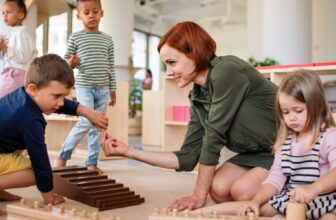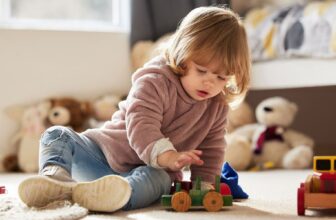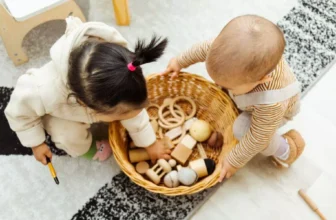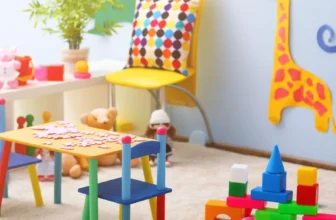
When considering Montessori toys that complement educational objectives, you should focus on selecting toys that encourage independent learning and creativity while nurturing sensory exploration. By choosing toys crafted from natural materials and offering open-ended play possibilities, you can provide a conducive environment for skill development and personalized learning experiences. The alignment of these toys with Montessori educational goals can have a profound impact on a child's growth and development.
Understanding Montessori Educational Goals
To grasp the essence of Montessori educational goals, focus on fostering independence and self-directed learning. Montessori education aims to cultivate a child's natural curiosity and instill a love for learning by allowing them to explore and discover at their own pace. By emphasizing independence, children develop critical thinking skills and a sense of responsibility for their own education journey.
In a Montessori environment, children are encouraged to make choices and take ownership of their learning experiences. This approach not only promotes self-reliance but also nurtures a sense of confidence and autonomy in each child. Through hands-on activities and materials designed to engage their senses, children develop a deep understanding of concepts through direct experience rather than rote memorization.
Furthermore, Montessori education values the individuality of each child, recognizing that they've unique strengths, interests, and learning styles. By fostering independence and self-directed learning, Montessori education empowers children to become lifelong learners who are capable of adapting to new challenges and pursuing their passions with enthusiasm.
Key Principles of Montessori Education
Exploring the core principles of Montessori education reveals a profound emphasis on personalized learning experiences tailored to each child's unique developmental journey. In Montessori education, one key principle is respect for the child, viewing them as naturally eager learners with an intrinsic desire to explore and discover. This principle guides educators to create an environment that fosters independence, self-motivation, and a love for learning.
Another fundamental principle is the focus on hands-on, experiential learning. Montessori education values the importance of sensory experiences and practical activities to help children grasp abstract concepts. By engaging in concrete, tangible experiences, children develop a deeper understanding of the world around them.
Additionally, the Montessori approach emphasizes the role of the prepared environment. Classrooms are carefully designed to promote exploration, concentration, and order. Each element within the environment is intentionally chosen to facilitate learning and encourage children to engage with materials independently.
Criteria for Selecting Montessori Toys
In considering Montessori toys, focus on selecting items that align with the principles of personalized learning and hands-on exploration emphasized in Montessori education. Look for toys that promote independent play and allow children to engage in activities that foster creativity, problem-solving, and skill development. Choose toys made from natural materials like wood, metal, or fabrics, as these align with Montessori's focus on connecting children with the natural world. Opt for toys that encourage sensory exploration, such as those with different textures, colors, and shapes, to stimulate a child's senses and cognitive development.
When selecting Montessori toys, prioritize items that are open-ended and versatile, enabling children to use them in various ways based on their interests and developmental stage. Avoid toys with batteries or that produce sounds and lights, as these can limit a child's imagination and creativity. Consider toys that promote practical life skills, like puzzles, sorting games, or building blocks, which support the development of concentration, coordination, and independence. By choosing Montessori toys that align with these criteria, you can provide children with enriching experiences that support their holistic development.
Tips for Incorporating Montessori Toys
Consider integrating Montessori toys into your child's playtime routine to enhance their learning experience and foster independent exploration. Start by observing your child to understand their interests and learning style. Tailor the Montessori toys you choose to align with these preferences, as this will increase engagement and enjoyment.
Create a designated space for Montessori toys in your home where your child can easily access and explore them independently. Rotating toys periodically can help maintain your child's interest and provide new learning opportunities. Encourage your child to tidy up after playing with the toys to instill a sense of responsibility and organization.
Engage with your child during playtime with Montessori toys by asking open-ended questions that stimulate critical thinking and problem-solving skills. Avoid the temptation to intervene unless safety is a concern, as this allows your child to develop autonomy and confidence in their abilities. By incorporating Montessori toys into your child's routine thoughtfully, you can create a rich learning environment that promotes creativity and self-discovery.




